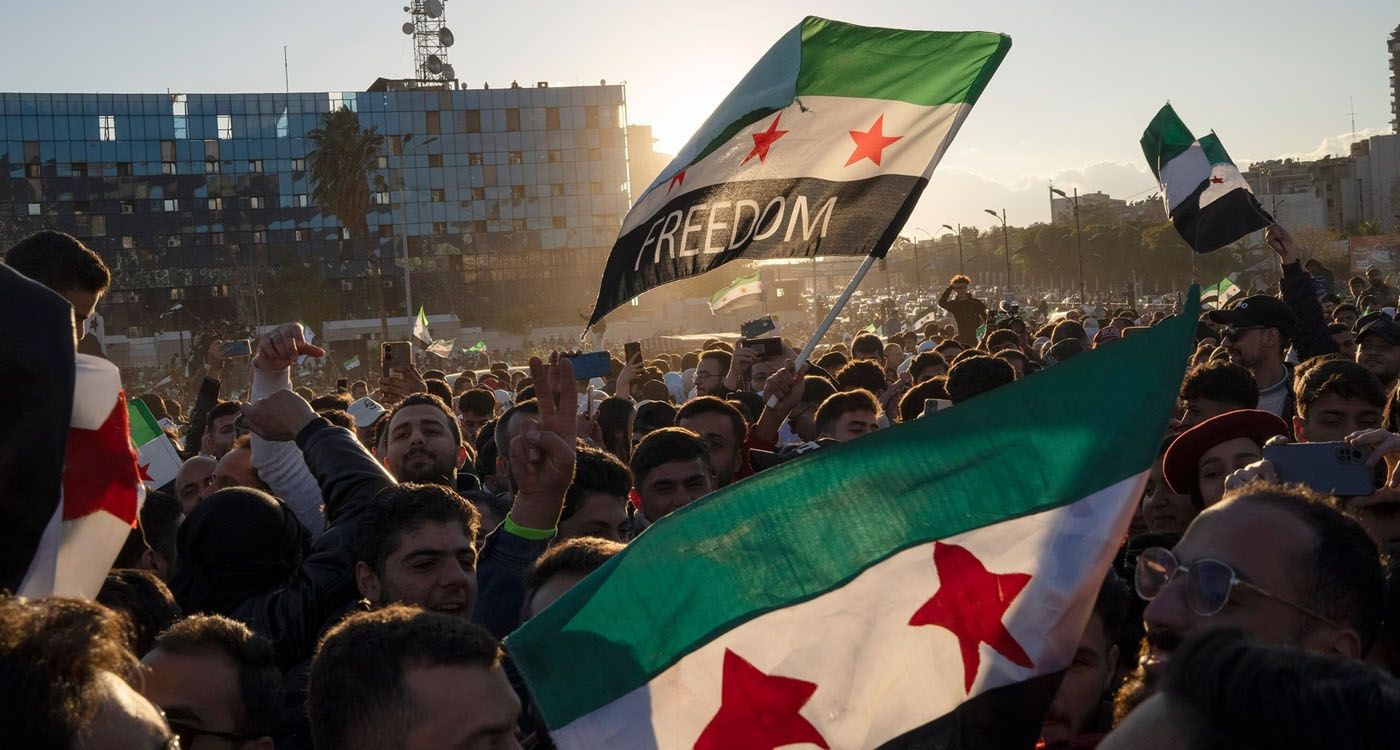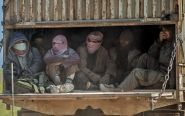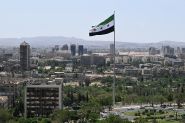- Home
- Middle East
- All (Diplomatic) Roads Lead to Damascus…

Syrians wave "revolutionary" Syrian flags during a celebratory demonstration following the first Friday prayers since Bashar Assad's ouster, in Damascus' central square, Syria, Friday, Dec. 13, 2024. ©AFP
Just as rapid as the fall of the Assad clan’s 54-year reign of unchallenged and relentless repression was the unprecedented rush of UN, American, European and regional (Turkish, Qatari, etc.) diplomats into Syria.
This influx appears oddly under the auspices of all the imaginable paradoxes that Syria embodies: international sanctions, foreign interferences (Turkish interventions, Israel’s annexation of the Golan Heights, etc.), and not least, the fact that talks are being held with the ruling coalition of rebels now in power, Hay’at Tahrir al-Sham (HTS), despite its designation as a “terrorist group” by several Western capitals, including Washington and London.
Is this unprecedented diplomatic parade toward Syria merely a pragmatic inspection of a new reality to “manage?” Or is it a “peaceful” offensive aimed at channeling and containing, if possible, the rise of Islamists, and potentially “smoothing out” the edges of the anticipated political transition? In any case, all Western and regional chancelleries are attempting, for one reason or another, to have a say in the new Syrian chapter.
First Contacts
Against the backdrop of established contacts with Hay’at Tahrir al-Sham (HTS), multiple meetings have been initiated with the new power holders in Syria.
Leading the charge is the UN Special Envoy for Syria, Geir Pedersen, who emphasized the need for a “credible and inclusive” transition, as well as “justice and accountability for crimes committed,” accompanied by a “humanitarian” bait: he hinted at offering “increased immediate aid for the population and for all refugees wishing to return.”
The European Union, for its part, seeks to position itself as a reliable actor in Syria’s recovery by advocating a refugee policy based on principles, combined with a strategy of investing in reconstruction. According to informed sources, “Europe is attempting to play an effective role at the risk of being sidelined” in Syrian territory.
The United States and the United Kingdom have stepped up their efforts to contact the new de facto government. Secretary of State Antony Blinken was the first American official to announce that the US government had established “direct” contact with Syria’s new leaders.
British Foreign Secretary David Lammy also confirmed that London had not only established diplomatic contact with the rebel group HTS, which led the offensive against Assad, but had also released £50 million ($99 million) in humanitarian aid for “the most vulnerable Syrians.” These overtures are rather peculiar toward “a proscribed terrorist organization,” as described by Lammy, from which he demands the promotion of a “representative and inclusive government” in Syria.
France, for its part, sent a diplomatic mission to Damascus on Tuesday, the first in 12 years, to “establish initial contacts” with the new authorities. Acting Foreign Minister Jean-Noël Barrot also emphasized that “the urgent needs of the population” would be assessed.
Doha announced on Tuesday the reopening of its embassy in Syria following the arrival of a Qatari delegation in the country on Sunday, which met with the new authorities.
Turkey, a major player in the Syrian conflict and a supporter of the new authorities, had already reopened its embassy in Damascus on Saturday after more than 12 years of closure. It declared itself “ready” to provide military assistance if the new Syrian government requested it, according to its Defense Minister Yasar Güler.
In return for these multiple advances, the new Syrian authorities are working to reassure the international community. The new interim Prime Minister, Mohammad el-Bachir, promised to “guarantee the rights of all,” including minorities and vulnerable communities. Damascus’ rulers also pledged to “respect all government institutions, the UN and other international organizations.”
The Nature of Diplomatic Implications
This game of “mutual appeasement” highlights the stakes involved: global actors on the Syrian chessboard stand to gain or lose a lot following Assad’s fall, especially as uncertainty looms over the fragile future of the country, which may be shaped by internal divisions and regional rivalries.
According to informed sources, the fall of the Assad regime marks a pivotal moment for Syria, heralding an era of both opportunities and uncertainties. Global interest in Syria stems from various political, economic and military motives, justified by its strategic geopolitical position.
These sources emphasize that the situation in Syria impacts the entire region, hence part of the diplomatic efforts to “frame” Syria’s transitional period to prevent potential political and military missteps, while also exploring economic opportunities as the country enters a phase of intensive reconstruction.
Based on statements issued after the meeting in Aqaba, Jordan, involving American, European, Arab and Turkish ministers and officials to discuss Syria after the fall of Bashar al-Assad’s regime, these sources underscore the insistence of various governments on “preventing the resurgence of extremist groups and ensuring the security and destruction of chemical weapons stockpiles.” They also point to the underlying motivations driving the diplomatic actions of the stakeholders, though they refrain from highlighting the “competition for influence”… for now. These sources suggest that Iran’s reduced role, combined with Russia’s weakening, creates a void that other powers will seek to fill.
France, which strongly supported both Kurdish forces and certain opposition groups with extremist elements, now faces the consequences of its past policies, as this strategy has not bolstered its influence in Syria. Consequently, the recent strong rhetoric from President Emmanuel Macron against Assad’s ousted regime has had little impact, with France overshadowed by more dominant actors, such as the US and Turkey. France is now trying to align its diplomatic efforts with contributions in areas like reconstruction, humanitarian aid or even mediation. Yet, even with such efforts, it is unlikely to be a central player in shaping Syria’s future due to its weakened position in the region.
Behind Syria’s fragmented military landscape, featuring groups supported by Turkey and the US and Israeli strikes that add complexity to the situation, the regional and international actors to whom the country’s new leaders will “rally” are emerging. These actors are likely to strengthen their ties with Turkey and Qatar, both long-time supporters of groups whose ideology, with nuances, aligns with that of the Muslim Brotherhood.
This alignment, however, does not exclude the possibility of engagement with Saudi Arabia and the UAE to facilitate Syria’s reintegration into the regional order.
On the ground, a “new order administered in northwest Syria by Turkey” is likely to emerge, while the entire Syrian chessboard, like the broader Middle East, would fall under “American supervision.”
Read more




Comments